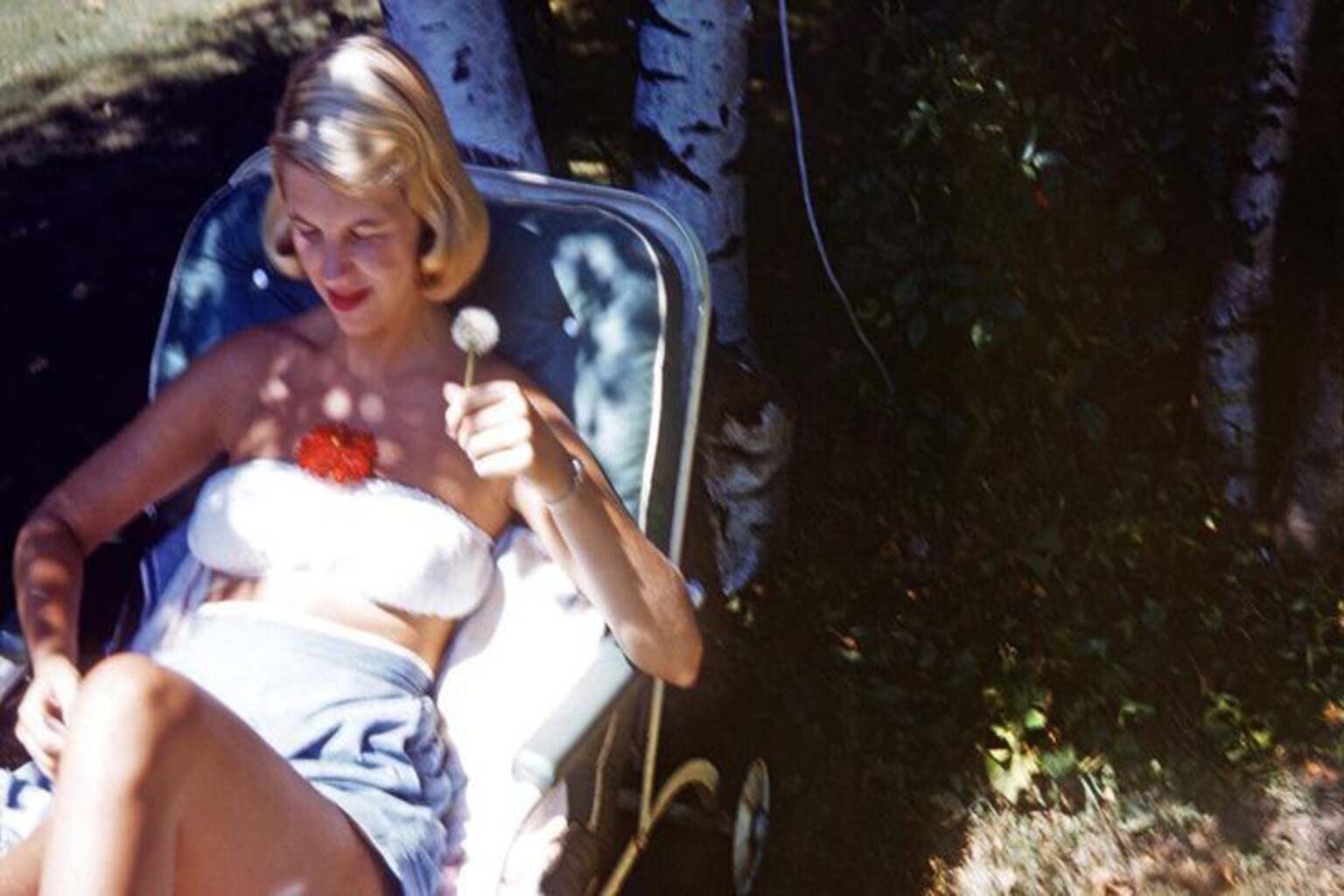Sylvia Plath is perhaps the most talked-about poet of all time. In fact, she became a household name after her tragic death, which somehow always overshadowed her legacy. Today, let’s not remember her for the way she died but for the way she spun words, for the way she wrote with emotional honesty, and the way she made language beautiful, painful, but mesmerizingly beautiful.
Read along and take a look as we analyze quotes from The Bell Jar, Plath’s only novel, which is laced with dark humor and social commentary.
- “I took a deep breath and listened to the old brag of my heart. I am, I am, I am.”
Analysis: This expression shows Esther’s reconfirmation of occupying the side of the suffering in despair. This repetition becomes rhythmic, like a heartbeat. Esther is struggling to hold on to herself. Even when Esther is feeling alienated from life, her body is insistent on living.
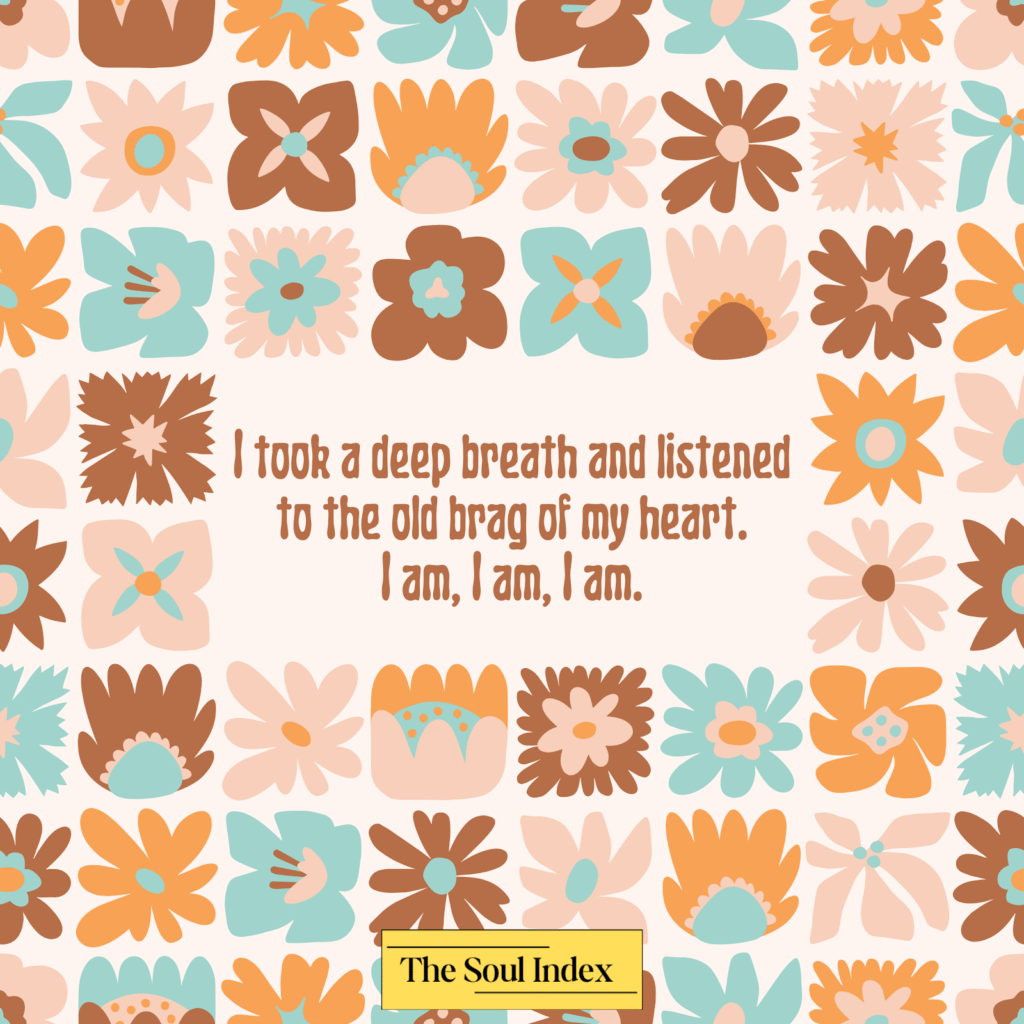
- “I felt very still and very empty, the way the eye of a tornado must feel, moving dully along in the middle of the surrounding hullabaloo.”
Analysis: This is my personal favorite. Plath uses the tornado metaphor to capture Esther’s paralysis within chaos. While the world continues to move and spin around her, she experiences an unnatural calm at the center of it all. Plath nails the way we feel when we are depressed. We feel both violent and motionless at the same time. - “To the person in the bell jar, blank and stopped as a dead baby, the world itself is the bad dream.”
Analysis: Plath depicts the bell jar as an image of suffocation. It seals Esther away from life and traps her in a distorted version of reality. The simile of the “dead baby” conveys horror and stillness, suggesting that depression suspends her between life and death. - “Wherever I sat—on the deck of a ship or at a street café in Paris or Bangkok—I would be sitting under the same glass bell jar, stewing in my own sour air.”
Analysis: Here Esther recognizes that her suffering is internal, not circumstantial. Isn’t that how we all feel? We can’t blame the outside world for the way we feel on the inside. No matter how much she travels, nothing can free Esther from her suffering. The “sour air” evokes the stagnant, self-contained nature of her despair, which she carries everywhere she goes. - “The silence depressed me. It wasn’t the silence of silence. It was my own silence.”
Analysis: What an unnerving distinction between external quiet and internal muteness! Esther’s silence becomes a mirror of her emptiness. Plath shows that she can no longer reach anyone for help or be reached by others. The line perfectly captures how mental illness shatters the boundary between environment and self.
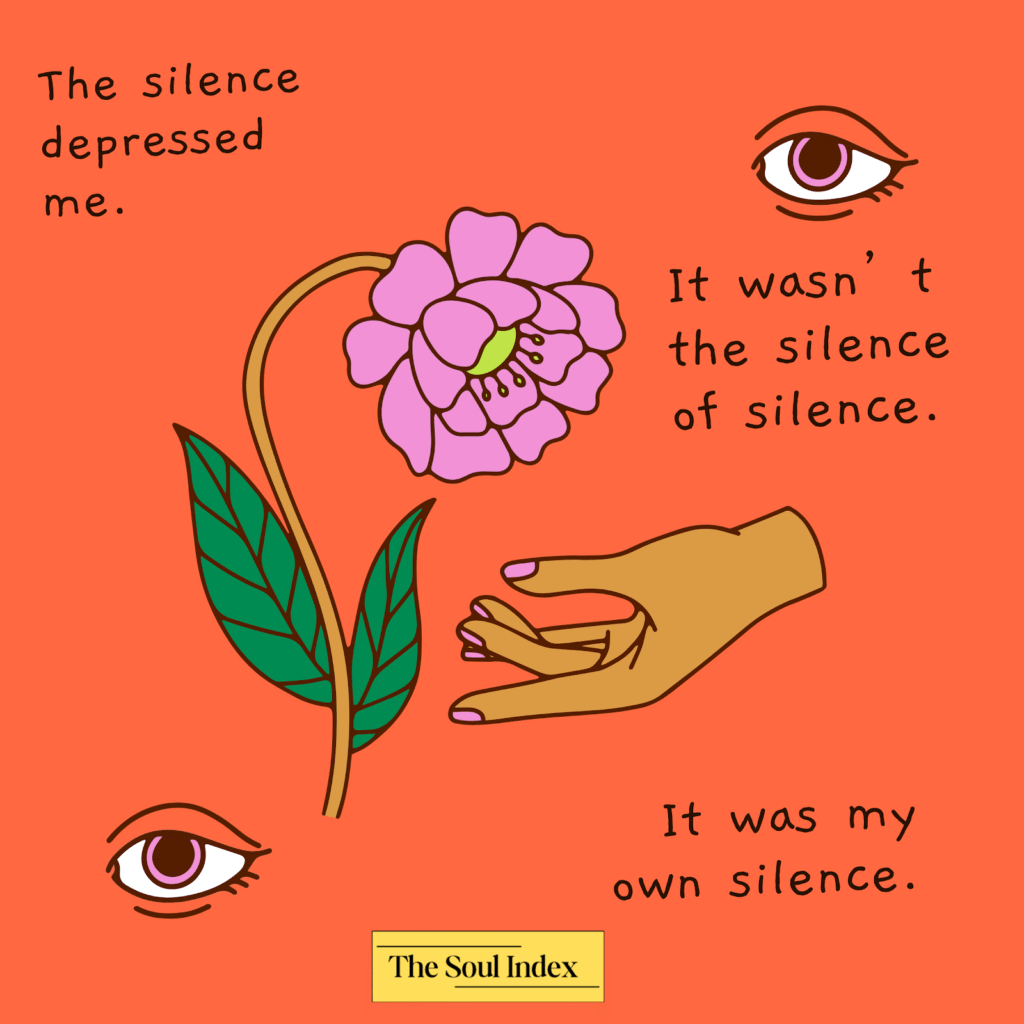
- “It was a queer, sultry summer, the summer they electrocuted the Rosenbergs, and I didn’t know what I was doing in New York.”
Analysis: Plath begins the novel with an image of death and disorientation. The Rosenbergs’ execution establishes an atmosphere of dread that mirrors Esther’s internal confusion. - “The trouble was, I had been inadequate all along, I simply hadn’t thought about it.”
Analysis: This confession reveals the self-cruelty of depression. So many of us feel inadequate in our lives. The same way, even Esther’s sense of worth collapses. Plath exposes the way mental illness rewrites one’s entire past as evidence of inadequacy. - “I saw myself sitting in the crotch of this fig tree, starving to death, just because I couldn’t make up my mind which of the figs I would choose. I wanted each and every one of them, but choosing one meant losing all the rest, and, as I sat there, unable to decide, the figs began to wrinkle and go black, and, one by one, they plopped to the ground at my feet.”
Analysis: This is one of the quotes from The Bell Jar that is always used out of context. Here is a simple explanation of the quote: Each fig represents a possible identity. It could be becoming a wife, poet, traveler, scholar, or whatever she wants, but selecting one means losing the others. When indecision is what she selects, it makes all the other possibilities decay. - “Because wherever I sat—on the deck of a ship or at a street café in Paris or Bangkok—I would be the same person. I couldn’t escape myself.”
Analysis: Esther confronts the terrifying permanence of her own consciousness. No matter how far she goes, her mind remains the same prison. She is always trapped in her mind, suffering, overthinking, and being miserable.
- “I felt like a racehorse in a world without racetracks.”
Analysis: What a clever metaphor that describes wasted/unused potential! Esther feels that she was born to do great things. However, she thinks the world doesn’t offer her an outlet to express her brilliance.
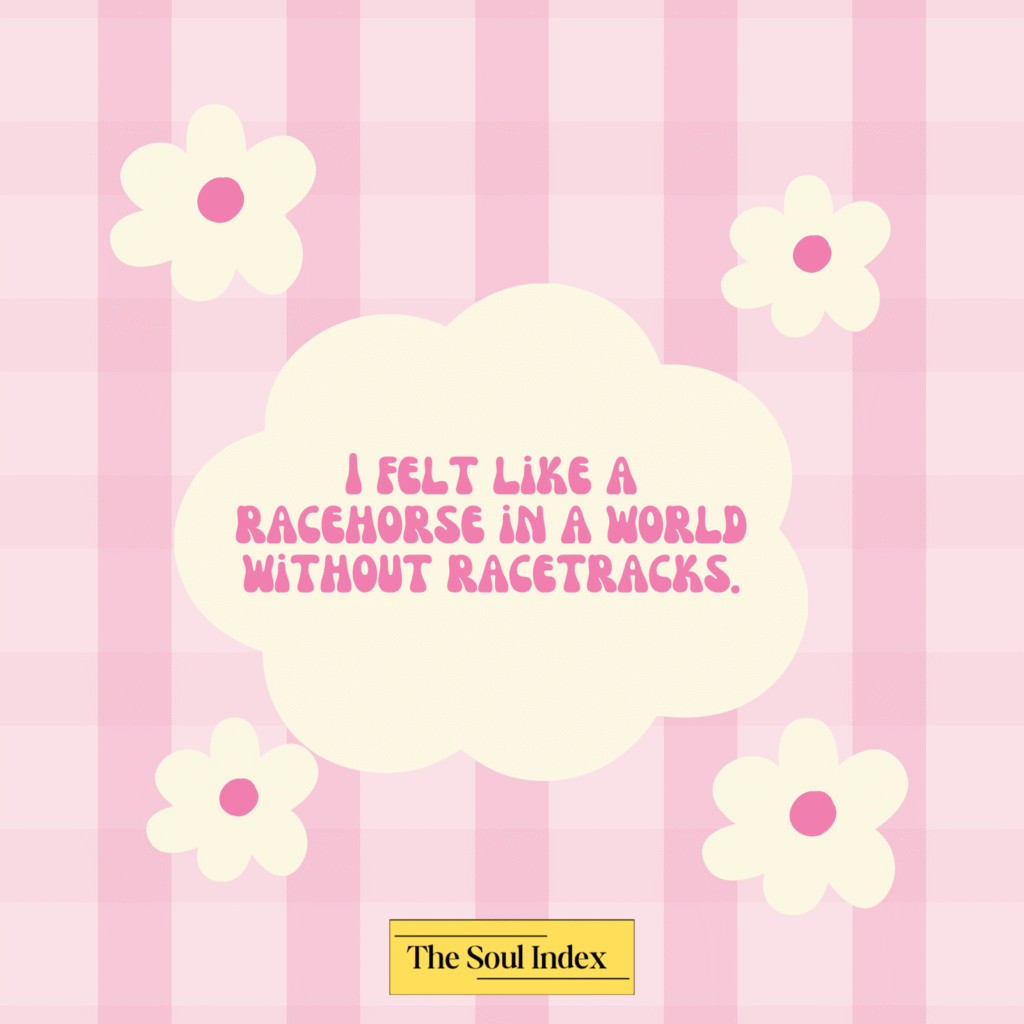
- “If you expect nothing from somebody, you are never disappointed.”
Analysis: This is, hands down, the best philosophy of life. Do not expect anything from anybody, regardless of who they are and where they stand in your life. When you don’t expect things from people, you are never disappointed. - “I thought the most beautiful thing in the world must be shadow.”
Analysis: Poets and writers usually draw comparisons between shadow and melancholy. Plath does the same here and shows that Esther finds beauty in darkness and ambiguity. Everyone can see a shadow but it conceals more than it reveals. This creates a mysterious image of Esther. - “It seemed silly to wash one day when I would only have to wash again the next. It made me tired just to think of it.”
Analysis: This seems like a small, irrelevant line from the book. But it’s not because it captures the rut a depressed person lives in. We start living in a strict routine that we hate. The repetition of life feels meaningless. Plath cleverly turns mundane fatigue into a symbol of existential weariness. - “I began to think maybe it was true that when you were married and had children it was like being brainwashed, and afterward you went about numb as a slave in some private, totalitarian state.”
Analysis: Plath didn’t just write about mental illness and heartbreak. She also dabbled in politics and social welfare. Here, she merges political and personal imagery. Esther compares marriage with the loss of individuality. Isn’t that what happens when we get married? W start losing our individuality. Domestic life dictates every aspect of our day. Hence, this line criticizes the society’s expectations from a woman which resonates even in this century. - “There must be quite a few things a hot bath won’t cure, but I don’t know many of them.”
Analysis: A rare moment of comfort in the novel. The bath becomes a metaphor for temporary healing and rebirth, a small act of control in a world that feels uncontrollable. It is an almost childlike faith in physical relief amid psychic pain. - “I felt my lungs inflate with the onrush of scenery—air, mountains, trees, people. I thought, This is what it is to be happy.”
Analysis: This fleeting moment captures the return of vitality. The physical act of breathing connects Esther to the external world she has felt estranged from. Plath’s language momentarily opens toward light and movement. - “The day I went into the sea I thought I would never come out again.”
Analysis: Calm and horrifying at once, this line describes Esther’s suicide attempt with eerie serenity. The sea represents both womb and grave, a place of dissolution for Esther. Plath’s tone reflects numb resignation rather than dramatic despair.
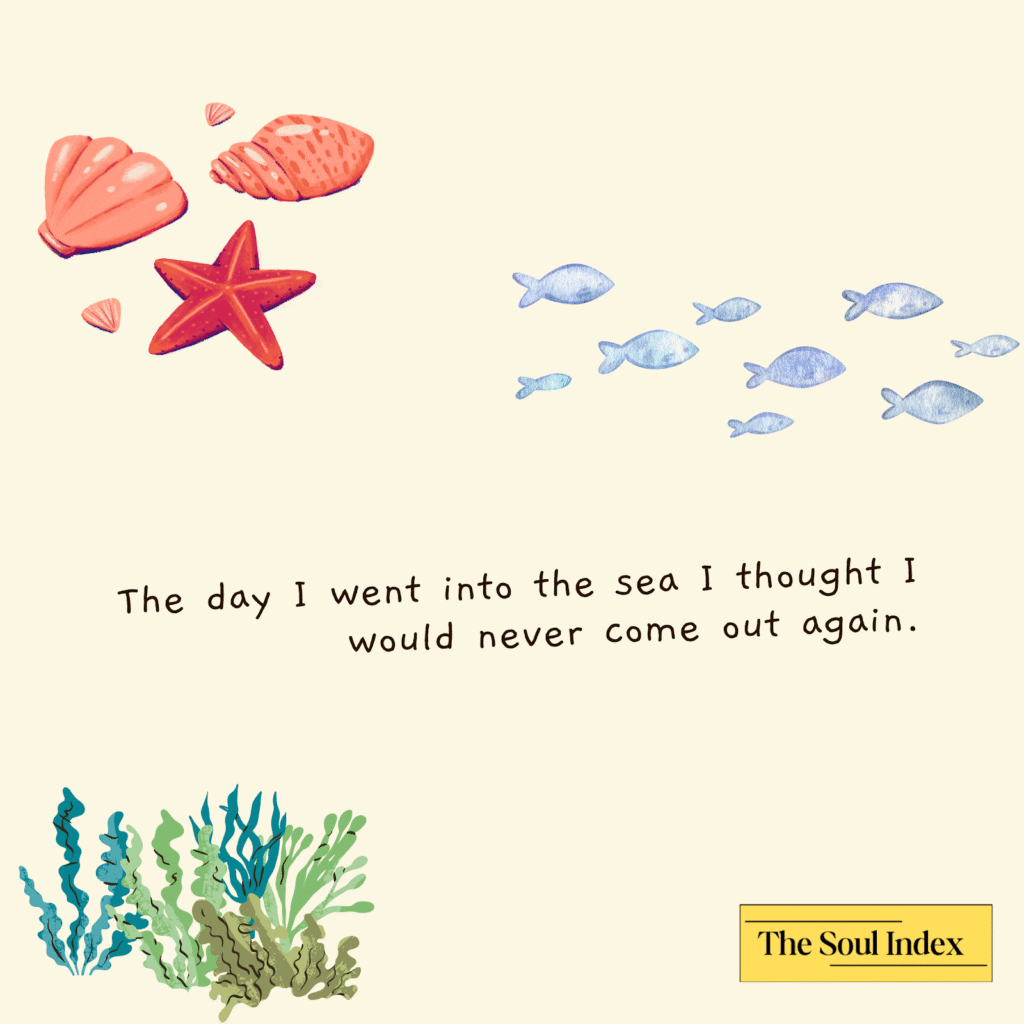
- “How did I know that someday—at college, in Europe, somewhere, anywhere—the bell jar, with its stifling distortions, wouldn’t descend again?”
Analysis: Even at her recovery’s edge, Esther fears relapse. The bell jar is cyclical, not cured but temporarily lifted. Plath ends the novel with the unsettling truth that mental illness rarely disappears entirely. - “The bell jar hung, suspended, a few feet above my head. I was open to the circulating air.”
Analysis: A delicate image of remission. The bell jar remains present but no longer suffocating. Esther’s tentative peace lies in awareness rather than denial of her condition. - “The floor seemed wonderfully solid. It was comforting to know I had fallen and could fall no farther.”
Analysis: This paradox captures a dark sense of safety within despair. Having hit bottom, Esther feels relief in finality. It is a moment of grim acceptance rather than recovery. - “I thought the next best thing to being very happy is to go out to the woods and be very still.”
Analysis: Stillness replaces joy as the most attainable state. Esther equates peace with withdrawal, imagining nature as a refuge from the pressures of performance. It is a portrait of quiet resignation disguised as calm.
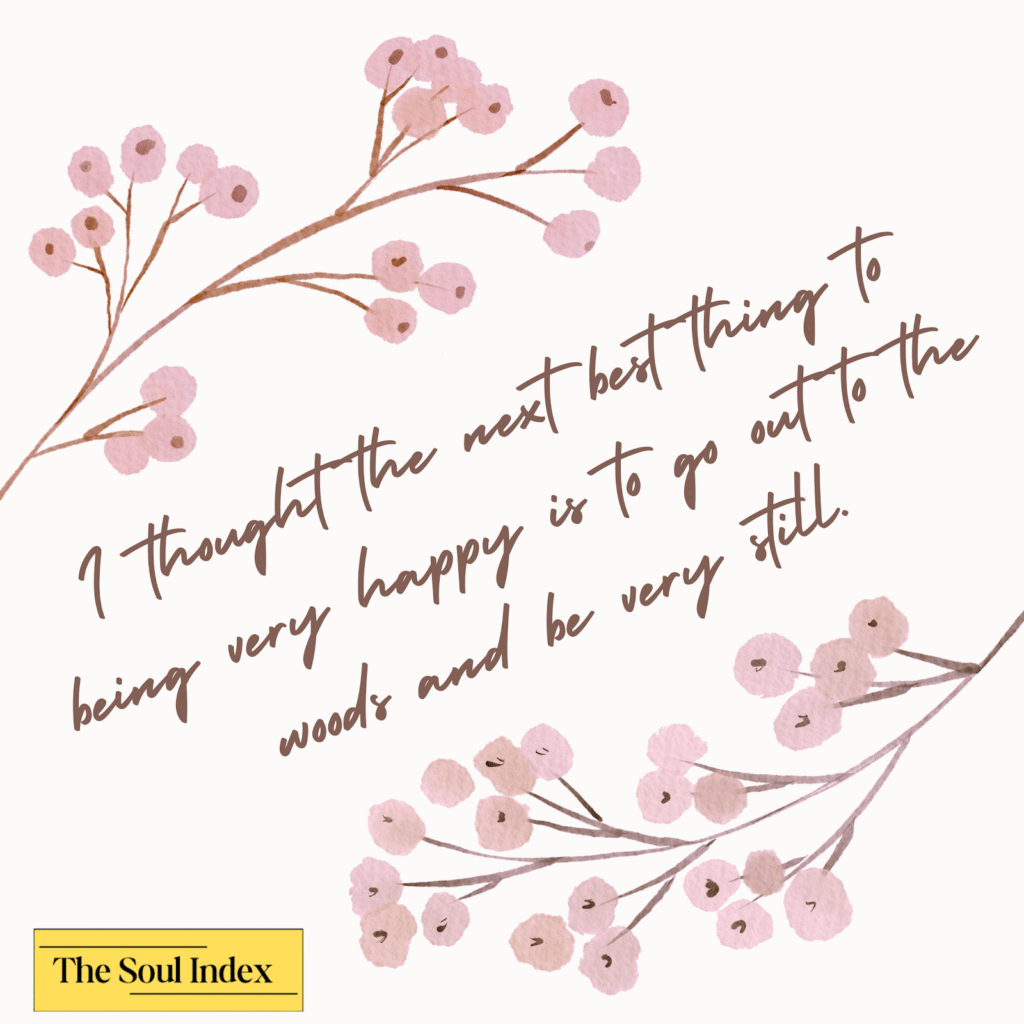
- “It was comforting to know I wasn’t alone in my depression. But it didn’t make me feel any better either.”
Analysis: While this awareness may not alleviate their suffering, it offers a measure of understanding and connection. Plath highlights how depression can resist comfort, even when empathy is present. - “I couldn’t understand why I was crying so hard. I wasn’t sad, or happy, or angry. I was nothing at all.”
Analysis: The frightening emptiness of depression replaces emotion with void. Esther’s tears emerge not from feeling but from the absence of it. Plath’s precision here makes numbness more haunting than despair. - “I felt myself melting into the shadows like the negative of a person I had once been.”
Analysis: This image of self-erasure portrays Esther’s identity dissolving. The “negative” suggests both photographic inversion and loss of substance. Plath’s language visualizes depersonalization as physical disappearance. - “I took a deep breath and said to myself: to the person in the bell jar, the world is the same as ever. But for the first time, I felt the glass lift, just slightly, and I knew that someday, somehow, I might breathe again.”
Analysis: The novel closes with cautious hope. Esther’s perception shifts—she feels air returning though the bell jar still hovers. Plath’s final note acknowledges recovery not as freedom from illness, but as the ability to breathe within it.
Conclusion
When I read Plath for the first time, I felt a bit unnerved yet it left me with a sense of being understood. That’s precisely the reason behind The Bell Jar quotes analysis so even you can articulate the feelings you’ve struggled to name or even understand. That’s the power of this book and of Sylvia Plath quotes. They don’t just haunt you. They understand you.
25 Best Quotes From Great Expectations That Still Resonate With Us Today

